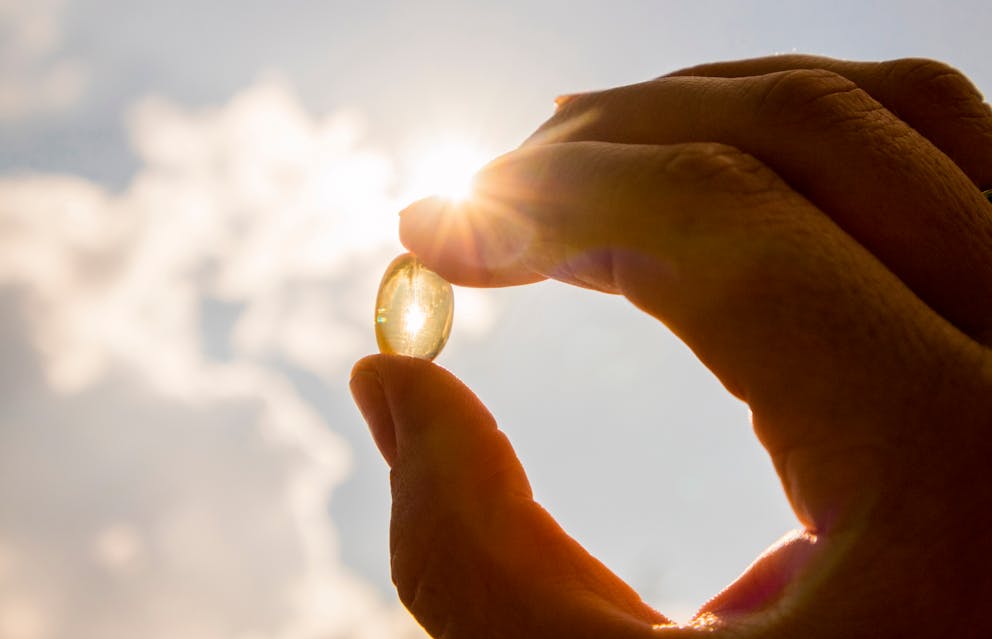The MOST Common Deficiency in All Skin Diseases (Dermatitis)
New research reveals that when it comes to optimal skin health, we often overlook the humble yet mighty Vitamin D. This hero of the skin world is behind maintaining hydration, managing inflammation, and fostering a robust immune system no fancy packaging required!
Beyond diet and lifestyle, our Vitamin D levels are significantly impacted by our sun exposure. While UV rays can enhance our skin health, excess exposure can increase the risk of skin cancer.
Balancing your Vitamin D levels through a harmonious mix of sunbathing, supplements, and well-planned nutrition can ultimately lead to radiant, healthy-looking skin.
The Role of Vitamin D in Maintaining Healthy Skin
In the dynamic duo of skin health, Vitamin D emerges as the reliable co-star. Its regulating powers over the immune system, its refreshing support of hydration, and its calming touch on skin conditions join forces to showcase its dedication to healthy skin.
It's no secret that vitamin D is essential for our bones, but did you know it's just as vital for our skin? Vitamin D helps regulate our skin's natural barrier function, preventing dryness and irritation while also protecting us from nasty skin conditions.

Vitamin D's impact on the skin's immune response
When it comes to skin conditions, vitamin D is a regulatory hero. By managing the immune response, it helps ease the symptoms of overactive conditions like psoriasis and eczema.
Research has shown that vitamin D can modulate the immune system by reducing inflammation and controlling the growth of skin cells.
This is particularly important for individuals with inflammatory skin conditions, as vitamin D can help alleviate symptoms and improve overall skin health.
The link between vitamin D deficiency and skin hydration
Vitamin D's influence on skin hydration is undeniable. Without sufficient levels, skin can become chronically dry, with reduced elasticity and an increased risk of damage.
The tiny miracle of vitamin D. When we have optimal levels of this essential nutrient, our skin's natural ceramides work their magic, keeping moisture locked in and skin plump and soft. Say goodbye to dry, flaky skin and hello to a luminous, health-giving complexion.
Understanding the Skin Microbiome and Vitamin D
An army of resilient crusaders marching across your skin surfaces, leaving nothing but trails of tranquility in their wake such is the formidable presence of the skin microbiome.
By controlling the bacterial warfare unleashed on their scales, our skin warrior troops safeguard their territories from intrusion. They do so in concert with vitamin D ally a powerful prescription for epidermal liberation.
With each careful harmony amidst their microscopic caper, researchers recently decoded longstanding inscriptions of partnerships giving that scientific the universe could stumble.
The role of the skin's microbiome in maintaining skin health
#1 Top spotter: a healthy skin microbiome, naturally balancing bacteria and yeast thrive, defending against harm, harmonizing skin pH, and keeping moisture levels satisfying. Say hello to radiant glow-age your radiant.
Skin care enthusiasts know that the microbial ecosystem on our skin is vital to our overall skin health. When this balance is disrupted, we're more likely to experience issues like acne, eczema, and skin infections.
It's essential to nurture a healthy skin microbiome to keep these issues at bay.
A thriving skin microbiome is just a healthy dose of vitamin D away. By getting enough of this vital nutrient, you'll be preventionally staving off fungal overgrowth and laying the foundation for picture-perfect skin.
Environmental Factors Affecting Vitamin D Levels and Skin Health
Sunlight and shadow occupy our days, casting a fluctuating spell on our skin health. From sunny weeks to wintry blasts, the rhythm of our daily lives beats to a sync with our body's internal clock.
Meanwhile, cortisol coursing through our veins indicates prolonged high-stress moments that siphon off our vital reserves, skimming vitamin D intake and, ultimately, impacting the radiance of our skin.
The impact of seasonal changes on vitamin D levels and skin health
The sun's UV rays are closely tied to our vitamin D levels. In the summer, our skin produces plenty of vitamin D after spending time outside. Conversely, during the winter, our vitamin D levels take a hit, much to the detriment of our skin health.
This decrease can trigger - or exacerbate - skin conditions like eczema and psoriasis, characterized by itchy, scaly patches.
Skilled skincare regimes always account for the intricacies of each season. In the summer, let the sun's warm rays rebalance your vitamin D levels. As winter sets in, reliance on vitamin D-rich foods and supplements keeps your skin shining bright.
Stress and its effect on vitamin D levels and skin health
Sarah Myers notes that high cortisol levels can disrupt our natural response to stress by suppressing our immune system and impacting our hormone regulation.
Additionally, by interrupting the balance of our vitamin D metabolism, high cortisol levels can affect our skin health and overall well-being.
When stress levels are consistently high, the skin takes a hit, with conditions like acne, eczema, and psoriasis reaching new heights of severity.
Regaining control starts with small changes: take up a relaxing hobby, practice morning stretches, or swap out snacking habits for fresh veggies.
By making self-care a priority, you can rebalance cortisol levels, optimize vitamin D metabolism, and revel in radiant, healthy-looking skin.
Vitamin D Supplementation and Topical Application for Skin Health
In addition to obtaining vitamin D through sun exposure and diet, supplementation and topical application can also support skin health.
Oral vitamin D supplementation for skin health
Oral vitamin D supplements can be an effective way to maintain adequate vitamin D levels, especially during the winter months or for individuals with limited sun exposure. The recommended daily allowance (RDA) for vitamin D is 600-800 IU per day, depending on age.
However, some individuals may require higher doses based on their specific needs and health conditions.
When it comes to supporting skin health, it's essential to consult with a healthcare professional to determine the right dosage of vitamin D supplements for your individual needs.
Regular supplementation can help regulate your immune system, lock in moisture, and manage skin conditions like skin conditions.

Topical vitamin D application and its potential benefits
Packaging medications as relief providers, calcipotriol has been engineered to operate at its best in managing skin health conditions.
While it needs critical testing procedures and close watch period would it provide less significant outcome instead enhance well skin progress or rather be present for continuous treatments.
a journey into the world of topical vitamin D and its potential to revolutionize skin health Though still being extensively researched, current findings hint at its capacity to maintain skin health functions By doing so
Your skin's health is deeply connected to the balance of vitamin D in your body. When your vitamin D levels are optimized, you can expect not only healthy skin, but also a strengthened immune system and even a healthy gut.
But what happens when the seasons change and the sunlight hours vary? Do you notice a difference in your skin's hydration and overall well-being?
By understanding the complex relationships between sun exposure, diet, and supplements, you can take control of your skin health and uncover the factors that impact your overall skin well-being.
Conclusion
Vitamin D for skin health is a crucial piece of the puzzle when it comes to maintaining a healthy, radiant complexion.
From supporting the skin's immune response to promoting hydration and a balanced microbiome, this essential nutrient plays a vital role in keeping your skin looking its best.
Let's be real - getting enough Vitamin D can be tough, especially when sunlight is scarce. But the good news is that you don't have to choose between a supplement and fresh air - you can do both!
Make small changes to your daily routine and start reaping the rewards of healthier, brighter-looking skin.
Radiant, youthful-looking skin is attainable, but only when your Vitamin D levels are in check. Commonly referred to as the "sunshine vitamin," a lack of it can lead to a host of issues, including dull, dehydrated skin.
Maximize your Vitamin D levels and say goodbye to dry, unhealthy skin.

Popular
08/21/2024
55.7K views
02/23/2025
46.8K views
11/18/2024
281.1K views
03/18/2024
11/21/2022




